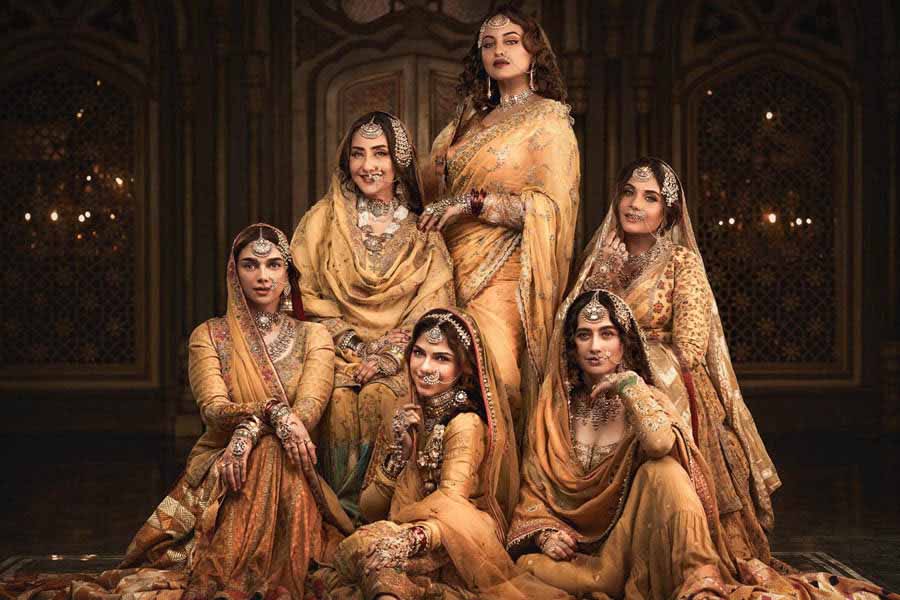Sanjay Leela Bhansali’s association with Manisha Koirala goes back three decades when he was assisting Vidhu Vinod Chopra in 1942: A Love Story, headlined by Koirala. She was also part of Bhansali’s feature debut as a director, Khamoshi: The Musical (1996). It is, thus, fitting that Koirala reunites with Bhansali as the veteran filmmaker takes a plunge into the world of OTT.
In Heeramandi: The Diamond Bazaar, streaming on Netflix, Manisha Koirala plays Mallika Jaan, the formidable madam of a brothel in pre-Independence Lahore, a queen bee for whose eye everyone must vie. However, her authority is shaken upon the arrival of Fareedan (Sonakshi Sinha) in Heeramandi. There's a history of conflict between these women, and unresolved scores to settle.
The eight episode series, with each episode clocking around an hour, begins in the 1940s when the freedom movement against British Raj was peaking. The sycophantic nawabs align themselves with the foreign rulers in exchange for titles and protection. However, it's the courtesans who wield the real power, safeguarding their patrons' secrets and sometimes even orchestrating their downfall.
In a series of flashbacks, we are told that Mallika Jaan harbours dark secrets of her own — a horrifying crime from her past, concealed with the help of the debauched nawab Zulfikar (Shekhar Suman). When these secrets resurface, they spark a power struggle between her and Fareedan.
Their confrontations are far from simple. Mallika's troupe of nautch girls including Lajjo (Richa Chadha), Waheeda (Sanjeeda Shaikh), Bibbo (Aditi Rao Hydari), and her own daughter Alamzeb (Sharmin Segal) stand in the way, each with their own motivations and ambitions. Meanwhile, the menacing police superintendent, Cartwright (played by Jason Shah), lurks in the shadows, relentlessly sniffing out skeletons in the ornate cupboards of the residents of Heeramandi.
Quest for freedom — for the nation and for the soul
Although the overarching theme of India’s freedom struggle does permeate the plot, it does not overshadow the interpersonal dynamics of the ladies in Heeramandi. Rebellion simmers in the background, but the focus remains on the power struggles within the brothel — a blend of soap opera intrigue with the sophistication of prestige drama.
Through the intricacies of kotha politics, Bhansali draws parallels with India's struggle for independence, showcasing how internal conflicts often hinder collective progress. The tawaifs, resigned to their fate, rarely challenge colonial authority until ignited by the sparks of solidarity within their community.
The series delves into the paradox of these courtesans living in golden cages, surrounded by luxury yet yearning for liberation. Despite their indulgent lifestyles filled with sumptuous food, exquisite attire, and an entourage of servants, they recognise the deeper significance of freedom beyond material comforts.
It’s a woman’s show out and out
From Chandramukhi in Devdas to Mastani in Bajirao Mastani to Gangubai in Gangubai Kathiawadi, Bhansali is known for crafting strong female characters, and Heeramandi is no exception. Manisha portrays Mallika with a blend of detachment and unwavering pride in her past glory. With subtle expressions and gestures, she unveils the life she has lived, the triumphs she has tasted, and the innocence she has surrendered.
Aditi Rao Hydari's portrayal of Bibbo, one of Mallika Jaan's daughters who becomes involved in the freedom movement, stands out as particularly powerful. Despite her initial timidity, Bibbo emerges as a woman of substance, driven by a fervent desire for freedom not just from British rule, but from societal constraints as well.
As Mallika’s adversary, Sonakshi Sinha delivers a standout performance, offering a glimpse of hope amidst the shadows of villainy, while Sanjeeda Sheikh impresses as a woman consumed by greed and vengeance. Richa Chadha’s portrayal of Lajjo has shades of Meena Kumari from Pakeezah.
Sharmin Segal and Taha Shah Badussha inject youthful energy as star-crossed lovers, though the former's performance often feels formulaic. Farida Jalal steals hearts with her portrayal of a dadi, exuding warmth and vitality at 75.
Bhansali makes the most of OTT format
Depicting courtesans on screen is Bhansali’s forte; from Saawariya to Gangubai Kathiawadi. Here, he allows his imagination go truly OTT in delivering a wholesome saga of tawaifs, kothas and mujras. The long format also comes to his aid as Bhansali takes his own sweet time to narrate the story at an unhurried pace.
Bhansali skillfully navigates the complexities of human nature, portraying characters with nuanced shades of grey rather than simplistic black-and-white dichotomies. It's akin to a chess game, where these women fiercely pursue their desires — whether it's revenge, rekindling old flames, or altering their destinies.
The period drama exudes the opulence and extravagance characteristic of a Sanjay Leela Bhansali production. From the meticulously crafted sets to the intricately designed costumes, every aspect reflects a level of sophistication that defines Bhansali's cinematic style. Even in the seductive allure of the courtesans captivating the nawabs, there's an underlying sense of dignity.
A soulful music album
Bhansali is not only one of the finest directors of our time but also a standout music composer. The Heermandi soundtrack showcases his reverence for Sufi and Urdu literary luminaries and comprises thumris and ghazals. Sakal Ban, sung by Raja Hasan, borrows verses from Sufi poet Amir Khusrow. Nazariya Ki Maari, voiced by Madhubanti Bagchi, is inspired by a song of the same title from Pakeezah (1972).










